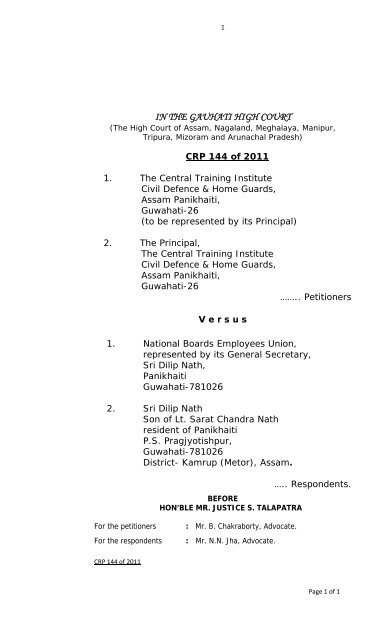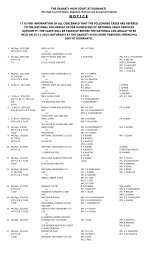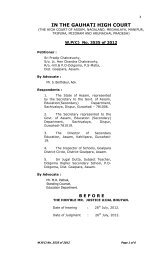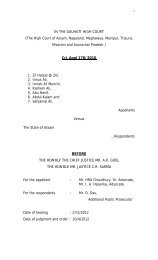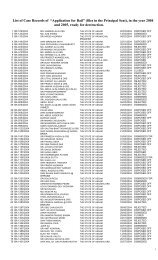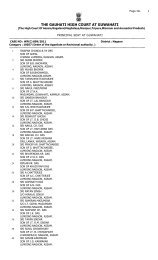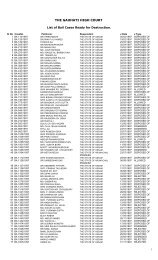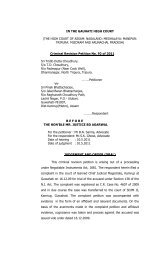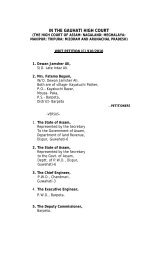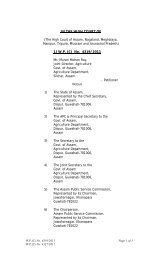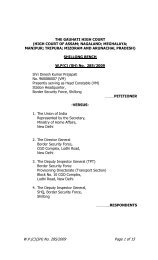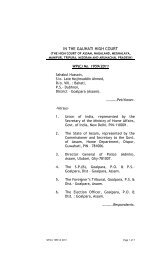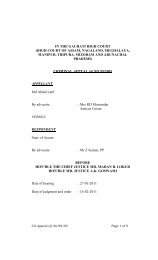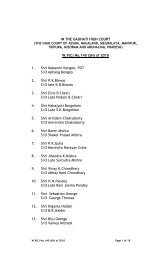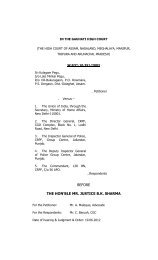CRP 144/2011 - Gauhati High Court
CRP 144/2011 - Gauhati High Court
CRP 144/2011 - Gauhati High Court
Create successful ePaper yourself
Turn your PDF publications into a flip-book with our unique Google optimized e-Paper software.
1IN THE GAUHATI HIGH COURT(The <strong>High</strong> <strong>Court</strong> of Assam, Nagaland, Meghalaya, Manipur,Tripura, Mizoram and Arunachal Pradesh)<strong>CRP</strong> <strong>144</strong> of <strong>2011</strong>1. The Central Training InstituteCivil Defence & Home Guards,Assam Panikhaiti,Guwahati-26(to be represented by its Principal)2. The Principal,The Central Training InstituteCivil Defence & Home Guards,Assam Panikhaiti,Guwahati-26V e r s u s1. National Boards Employees Union,represented by its General Secretary,Sri Dilip Nath,PanikhaitiGuwahati-7810262. Sri Dilip NathSon of Lt. Sarat Chandra Nathresident of PanikhaitiP.S. Pragjyotishpur,Guwahati-781026District- Kamrup (Metor), Assam.BEFOREHON’BLE MR. JUSTICE S. TALAPATRA…….. Petitioners….. Respondents.For the petitionersFor the respondents: Mr. B. Chakraborty, Advocate.: Mr. N.N. Jha, Advocate.<strong>CRP</strong> <strong>144</strong> of <strong>2011</strong>Page 1 of 1
2Date of hearing : 02.08.2012Date of deliveryof judgment & order : 10.08.2012JUDGMENT & ORDERThis is a petition filed under Article 227 of the Constitution ofIndia against the order dated 17.03.<strong>2011</strong> passed by the Munsiff No.2,Kamrup, Guwahati in Title Suit NO. 198 of 2009.2. The impugned order as passed by the Munsiff No.2,Kamrup, Guwahati, the prayer of the defendant No.5 and 6, in theTitle Suit No.198 of 2009 for leave to produce some documents,marked by them as Exbt.B, Exbt.C, Exbt.D & Exbt.E was rejected.The petitioners made attempt to explain the non production in theappropriate stage by stating that the Principal, Central TrainingInstitute, Civil Defence & Home Guards i.e. the defendant No.6could not locate documents. Therefore, when those documents ondiscovery were handed over to the counsel along with theexamination-in-chief under Order XVIII Rule 4 of the C.P.C. TheMunsiff No.2, Kamrup, Guwahati held that the defendants had notfiled the documents marked as Exbt.B,C,D & E along with thepleadings. Even the defendant No.5 & 6 did not seek any leave ofthe <strong>Court</strong> to allow them to introduce those documents and as suchthose documents were not received in the records but onedocument as marked Exbt.A was received, for the reason that the<strong>CRP</strong> <strong>144</strong> of <strong>2011</strong>Page 2 of 2
3said document came into being in the pendency of the suit and thedefendants obviously could not have produced it. As such the fourdocuments were not received in the records. In the said order, itis recorded that those documents were not accepted for filingwithout seeking leave of the <strong>Court</strong>. The defendant No.5 & 6thereafter filed a petition under Order VIII Rule 1A read withSection 151 of the C.P.C. seeking leave for filing the documentsi.e. B, C, D & E stating interalia that the respondent No.6 hadassumed the office in the month of May, 2000. He was not abreastof the progress of the case and accordingly in a belated stagethose documents were filed. The former Principal had retired afterfiling of the Witten Statement and there was a dislocation in theadministration. On discovery of the documents, the respondentNo.6 placed those documents for production in the <strong>Court</strong>. It isfurther stated that if those documents were not allowed toproduce in the records, it would cause miscarriage of justice.3. Mr. B. Chakraborty, learned counsel appearing for thepetitioners submitted that the impugned order has been passed bythe Munsiff No.2, Kamrup mechanically, not considering the aspectthat those documents would enable the <strong>Court</strong> in determining thereal question in the controversy between the parties. The duediligence shall not come in the way of accepting the documents inview of the circumstances as narrated in the petition. Learnedcounsel for the petitioners also submitted that in the Written<strong>CRP</strong> <strong>144</strong> of <strong>2011</strong>Page 3 of 3
4Statement the references of the documents have been elaboratelymade, but those were not catalogued as required. He submittedthat the provisions of order VIII Rule 1-A of the C.P.C provide that“where the defendant bases his defence upon adocument or relies upon any document in hispossession or power, in support of his defence orclaim for set-off or counter-claim, he shall enter suchdocument in a list, larger interest of the force andshall produce it in <strong>Court</strong> when the written statementis presented by him and shall, at the same time,deliver the document and a copy thereof, to be filedwith the written statement.”The said provisions cannot be read as mandatory,rather it has to be constructed as directory in nature and for thatpurpose by the Code of Civil Procedure(Amendment Act), 2002.Rule 3-A of Order VIII of the C.P.C. has been engrafted.“ (3)A document which ought to be produced in<strong>Court</strong> by the defendant under this rule, but, is not soproduced shall not, without the leave of the <strong>Court</strong>, bereceived in evidence on his behalf at the hearing ofthe suit.”4. On scrutiny of the grounds such leave for receiving thedocuments in the records was not considered. The documents notfiled earlier or not catalogued in the Written Statement cannot beallowed to form the part of the records. The fundamental principlewhich is required to be taken care of is the element of prejudice tothe other side.<strong>CRP</strong> <strong>144</strong> of <strong>2011</strong>In support of his contention Mr. B. Chakraborty,learned counsel for the petitioners relied on a decision in ZolbaPage 4 of 4
5Vs. Keshao & Others as reported in (2008) 11 SCC 769 wherethe Apex <strong>Court</strong> held that :“14. In Salem Advocate Bar Assn. V. Union ofIndia (2005) 6 SCC 344 it has been clearly held thatthe provisions including the proviso to order 8 Rule 1CPC are not mandatory but directory. It has been heldin that decision that the delay can be condoned andthe written statement can be accepted even after theexpiry of 90 days from the date of service of summonsin exceptionally hard cases. It has also been held inthat decision that the use of the work ‘shall’ in Order8 Rule 1 CPC by itself is not conclusive to determinewhether the provision is mandatory or directory. Theuse of the work ‘shall’ is ordinarily indicative ofmandatory nature of the provision but having regardto the decision in that case, the same can beconstrued as directory.”It has been further held in the said decision that:“it cannot also be forgotten that in anadversarial system, no party should ordinarily bedenied the opportunity in participating in the processof justice dispensation.”5. Mr. B. Chakraborty, learned counsel for the petitionersfurther submits that for purpose of leave ‘sufficient cause’ shouldbe construed as to serve the ends of justice. To buttress hiscontention, a decision of the <strong>High</strong> <strong>Court</strong> of Andhra Pradesh inKancherla Saradha Devi Vs. Saripella Sivaramaraju & othersreported in AIR 1995 A.P 291, the Andhra Pradesh <strong>High</strong> <strong>Court</strong>held that:“7. In addition to the legal implication statedabove, this court feels that they may be furtheramplified. In the nature of the true implication of<strong>CRP</strong> <strong>144</strong> of <strong>2011</strong>Page 5 of 5
6order 13, Rules 1 and 2 of C.P.C. the work ‘shall’ usedtherein may be difficult to be read as mandatory. Inthe Code of Civil Procedure there are various stages atwhich documents can be produced for the perusal ofthe <strong>Court</strong> and for various other purposes.”Finally, the said decision concluded that if it is foundthat an order of refusing the leave to receive the documents wouldoccasion of failure of justice or cause irreparable injury againsthim. It was made that such order should be allowed to stay.6. Similarly, the Madrass <strong>High</strong> <strong>Court</strong> in S. MahimaidossVs. Vanathayya & Others reported in AIR 2000 Mad.289 heldthat:“Order 13 Rule 4 speaks aboutdocumentary evidence to be produced at orbefore the settlement of issues and Rule 2speaks about effect of non-production ofdocuments.Order XIII- Rule 1. Documentary evidenceto be produced at or before the settlement ofissues (1) The parties or their pleaders shallproduce at or before the settlement of issues, althe documentary evidence of every descriptionin their possession or power, on which theyintended to rely, and which has not already beenfiled in <strong>Court</strong>, and all documents which the <strong>Court</strong>has ordered to be produced.(2) The <strong>Court</strong> shall receive the documentsso produced: Provided that they areaccompanied by an accurate list thereofprepared in such form as the <strong>High</strong> <strong>Court</strong> directs.(2) Effect of non-production of documents:<strong>CRP</strong> <strong>144</strong> of <strong>2011</strong>(1) no documentary evidence in thepossession or power of any party which shouldhave been but has not been produced inPage 6 of 6
7accordance with the requirements of Rule 1 shallbe received at any subsequent stage of theproceedings unless good cause is shown to thesatisfaction of the <strong>Court</strong> for the non-productionthereof and the <strong>Court</strong> receiving any suchevidence shall record the reasons for so doing.(2) Nothing in sub-rule (1) shall apply todocument,(a) produced for the cross-examination ofthe witnesses of the other party, or(b) handed over to a witness merely torefresh his memory.As per Rule, 2 unless good cause is shownto the satisfaction of the <strong>Court</strong> for nonproductionof a particular document, the partycannot be permitted to file any document at alater date after settling of issues. Here, we haveto consider whether the petitioner herein hadfurnished good cause for non-production ofdocuments in time or not. I have already statedthat necessary averments had been made in Para7 of the written statement regarding the legalnotice of the plaintiff dated 29.04.1977.Admittedly, the plaintiff did not file replystatement disputing the said averment made inthe written statement. No doubt, PW-1 wasexamined and closed his evidence. However, 2 nddefendant is yet to be examined. In such acircumstances I am of the view that thepetitioner herein has made out a case forreception of the list of documents. Even if thesaid document is marked through the 2 nddefendant, it is open to the first respondentplaintiffto cross-examine him regarding the saiddocument. The said opportunity is available tohim even now.”7. Mr. B. Chakraborty, learned counsel for the petitionersfurther submits that the provisions of Order XIII Rule 1 & 2 arealmost similar to the provisions of Order VIII Rule 1 of the C.P.C.<strong>CRP</strong> <strong>144</strong> of <strong>2011</strong>Page 7 of 7
8Hence the principle as laid down for Order XIII Rule 1 and 2 of theC.P.C can be applied to the provisions of Order VIII, Rule 1 ofC.P.C. He also referred a decision of Orissa <strong>High</strong> <strong>Court</strong> in BhikariCharan Patra Vs. Basanti Bewa and others as reported inAIR 1985 Orissa 49 where it has been held that“8. The technical ground on which the learnedMunsif has rejected the petition is notsustainable. The learned Munsif rejected the firstpetition as no particulars showing good cause tothe satisfaction of the <strong>Court</strong> for the late filinghad been furnished in the petition. The rejectionwas, therefore, not on merits, i.e. after takingthe cause shown into consideration and holdingthe same unsatisfactory. The rejection was notdue to the learned Munsif not being satisfiedwith the cause shown. The second petition withreasons was therefore maintainable.”This decision has been referred for obvious purposethat even if by the order dated 17.03.<strong>2011</strong>, the trial <strong>Court</strong> statedthat for absence of any petition seeking leave the documentscannot be received. The said order dated 17.03.<strong>2011</strong> cannotcreate any bar in filing the subsequent petition by the defendantsNo.5 and 6 seeking leave to file the same documents.8. Mr. B. Chakraborty, learned counsel appearing for thepetitioners submitted that the reasons assigned for rejecting theprayer for leave to receive the documents is not based on theprinciples of natural justice. The trial <strong>Court</strong> has failed to measureup the consequences of the said order. If the said order is allowedto stay, it would cause the miscarriage of justice.<strong>CRP</strong> <strong>144</strong> of <strong>2011</strong>Page 8 of 8
99. On the other hand, Mr. N.N. Jha, learned counselappearing for the respondents submitted that it cannot bebelieved that respondent No.6 being the party in the suit anddocuments having been in his custody could not produce thosedocuments at the time of filing the Written Statement. Suchconduct only creates serious suspicion to impounding ofdocuments and causes an adverse impact on the judicialproceeding. He submitted that the defendants No.5 & 6 with anoblique purpose did not deposit the documents so as to deprivethe plaintiffs from giving the proper evidence of rebuttal, so farthe contents of those documents are concerned. He furthersubmitted that after the documents are filed, the plaintiffs got aright to inspect those documents and to insist the <strong>Court</strong> forframing the appropriate issues. Moreover, the petitioner has gotright to lead the evidence on consideration of the records. Belatedacceptance of the documents would deprive the plaintiffs of thoserights as safeguarded by the procedural law.In support of his contention Mr. N. N. Jha, leanedcounsel relied on a decision of this <strong>Court</strong> in Nepal Das & AnotherVs. Aditi Deori and Others as reported in <strong>2011</strong>(2) GLT 336where this <strong>Court</strong> held as under :<strong>CRP</strong> <strong>144</strong> of <strong>2011</strong>“51. When the question of leave arises, the<strong>Court</strong> has to see that the purpose of producingthe documents at the pre-trial stage is notdefeated. The leave has to be, therefore, grantedPage 9 of 9
10bearing in mind the three conditions precedents,namely, (i) the petitioner must disclose whetherthe document, sought to be introduced, was inhis ‘possession or power’ or not at the time ofpresentation of the plaint; (ii) In either case,whether the document was in his ‘possession orpower’ or not, the reasons, why the documentswas not produced along with the plaint, orreasons why the document was not entered inthe list, as the case may be; and (iii) why it wasnot disclosed, at the time of the presentation ofthe plaint as to where the document and how hehas come to know in whose ‘possession orpower’ the document is or was.52. The reasons for granting leave may varyfrom case to case; hence, no formula can be laiddown on the principles on which the leave is tobe granted. The granting of leave would dependon the given set of facts and circumstances in acase. Consequences of not filing of documents,where pleadings are presented without any listof documents as well as fall out of documentsnot being filed on or before settlement of issuesand when production of document is not sought.10. Mr. N.N. Jha, learned counsel appearing for therespondents further submitted that the contingencies has beenformulated in the said decision. Nobody can escape the rigours ofthe procedural law which are designed to ensure the justice. This<strong>Court</strong> finds that the following documents were sought to beintroduced in the proceeding by the defendants No. 5 & 6 :(i) Certified copy of the revenue authoritiesshowing allotment of land to defendants (petitioners);(Exhibit-B).(ii) File No.CTI204/97 in original along withthe copy of the letter dated 01.09.1981 showinghanding over land on 21.05.1981; (Exhibit-C).<strong>CRP</strong> <strong>144</strong> of <strong>2011</strong>Page 10 of 10
11(iiii) Communication dated 15.12.1987 as madeto Director General Home Guards, Assam of functionof the CTI; (Exhibit-D).(iv) Certified copy of the Writ Petition (C)No.4850/08(Exhibit-E).11. It appears that all the documents are in the nature ofthe public documents within the meaning of Section 74 of theEvidence Act. No doubt, the leave petition does not all the timepersuade to grant leave unless the causes are demonstratedsatisfactorily. The defendants No. 5 & 6 have committed latchesby not giving the catalogue of documents in the WrittenStatement or by a separate sheet even though there is referencesof those documents in the Written Statement but mere referencecannot be treated sufficient. A catalogue of documents is either tobe incorporated in the Written Statement or be produced alongwith Written Statement. If the documents are not available, inthat case the defendants must indicate in the Written Statementabout the possible custody for compelling production by the <strong>Court</strong>.It appears that even after hearing, those documents were notintroduced whereas the law has created a deadline for productionof all the documents by the parties. On consideration of the natureof the documents and the explanation that was provided that thedocuments could not be filed before the settlement of the issuesfor change of the head of the institute namely, the Principal,Central Training Institute (CIT) cannot be discarded on the face.<strong>CRP</strong> <strong>144</strong> of <strong>2011</strong>Page 11 of 11
12But to balance with the interest of justice, the <strong>Court</strong> is bound tobe liberal for achieving the ends of justice. As such the 4(four)documents as marked by the defendants No.5 & 6 as Exbt.B,Exbt.C, Exbt.D & Exbt.E shall be allowed to be introduced in theevidence by the defendants No.5 & 6 subject to condition that thedefendant-petitioners shall pay a cost of Rs.10,000/- to theplaintiff-petitioner within a period of 15 days from today and forthat purpose leave is granted to the defendant-petitioners No.5& 6 under Order VIII Rule 3A of the C.P.C.It is further directed that if the plaintiff-respondentsintend to re-examine their witnesses in view of the documents asallowed to be introduced in the records, the trial <strong>Court</strong> shall allowthem the said opportunity. If the cost is not paid within 15 days,the trial court shall proceed with the suit in accordance with lawwithout receiving those documents Exbt.B, Exbt.C, Exbt.D &Exbt.E in the records.For the aforesaid reasons, the petition stands allowed.JUDGESujay<strong>CRP</strong> <strong>144</strong> of <strong>2011</strong>Page 12 of 12


